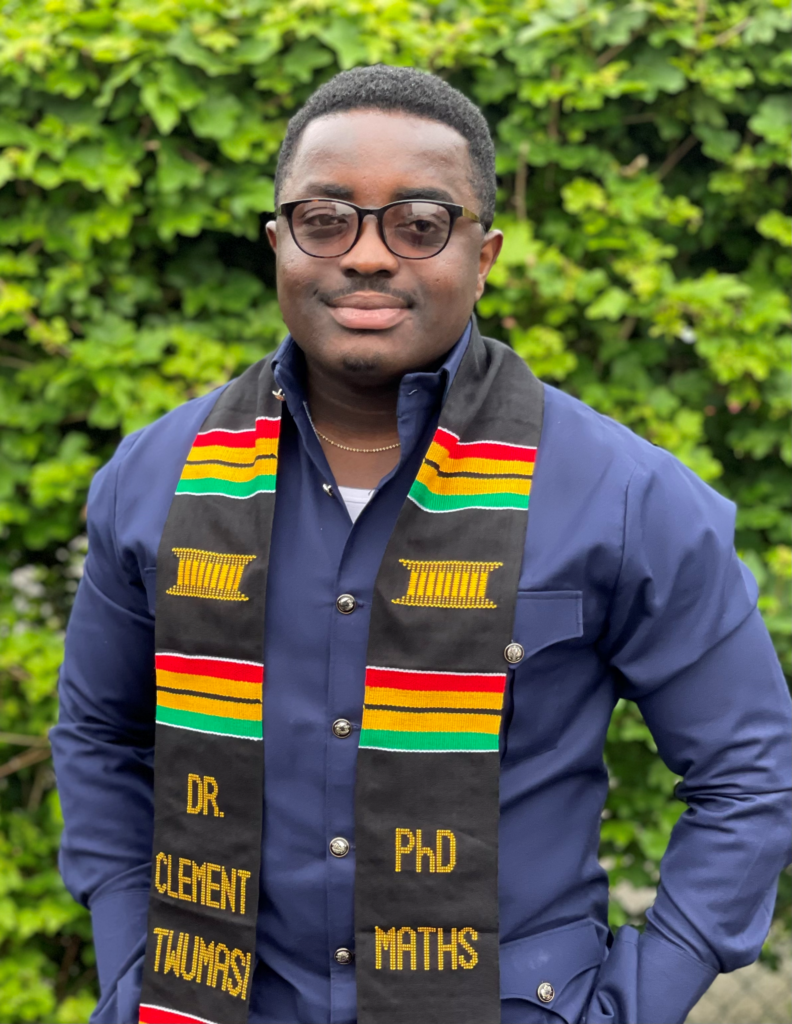
Dr Clement Twumasi is an Oxford BRC-supported medical statistician whose role involves providing a range of statistical support for clinical trials and other vaccine-related studies, as well as assisting with funding applications.
Based at the University of Oxford’s Nuffield Department of Medicine (NDM), Clement provides essential statistical support to the BRC’s Life-saving Vaccines Theme, with a particular focus on chronic disease, ageing and viral infections such as HIV, hepatitis B and hepatitis C.
He also offers statistical consulting services to other research groups in the Jenner Institute and collaborates with the Oxford Vaccine Group.
Securing a position at the University of Oxford, combined with his outstanding academic track record, helped him obtain a Global Talent Visa. This UK visa is awarded to foreign leaders or potential leaders in specific fields, including academia and research. Clement had not only been awarded a national prize in 2018 for the best mathematics research in Ghana following his master’s programme, but was also named in 2020 among the 200 most exceptional mathematicians and computer scientists worldwide of their generation by international experts at the 8th Heidelberg Laureate Forum.
Clement joined the University of Oxford from the Imperial College London Clinical Trials Unit, where he first applied his expertise in mathematics and statistics to healthcare research.
He completed his PhD in Mathematics at Cardiff University in 2021 as a Vice Chancellor’s Scholar. His research developed new mathematical models to better understand the spread different parasites in different host populations.
Clement said: “My continuous pursuit of personal growth motivates me to always seek progression. Early in my career, I recognised a gap in my expertise within clinical trials, epidemiology, and health research, stemming from my pure mathematics and statistics background. This realisation fuelled my ambition to become a robust statistician. It prompted me to embark on a career in medical research, where I have actively engaged in diverse research domains such as machine learning, time series modelling, compartmental disease modelling, stochastic simulations, and approximate Bayesian computation.
“Clinical trials are so sensitive that any mistake you make with your statistics can affect policy.”
“While my PhD focused on computational biology, I have successfully applied these advanced mathematical techniques to explore other areas of research interest.”
Clement has been keen to share his knowledge with researchers and students and when the COVID pandemic hit, he started up an online programming school and YouTube channel, where he could teach advanced programming and statistics – open to anyone, but in particular targeting students from Africa to help them improve the application of their theoretical skills.
Clement’s primary role is to support the research of a number of BRC-supported Principal Investigators (PIs), including Professors Eleanor Barnes, John Frater, Susie Dunachie and Paul Klenerman. But he has found that his services are in great demand from other researchers. “I found that other PIs were also interested in getting support for their grant applications. I developed a new lecture series, starting with a broad introduction to statistics open to everyone, and posted on YouTube.
“The goal was to enable staff and students to watch and learn at their own pace, anytime. Subsequently, I initiated weekly and biweekly series at NDM. Every Wednesday, I host statistics drop-in sessions and alternate biweekly with student-led case-study presentations. Staff and students are welcome to join these sessions to ask questions or participate.”
Clement’s YouTube channel with his online tutorials and lectures now has close to 20,000 subscribers.
Clement is involved in several trials at NDM, including the RIO trial, which investigates whether a new treatment can maintain an undetectable viral load in HIV without anti-retroviral therapy, and the AbVax trial, a randomised phase II clinical trial exploring combination vaccine regimens and broadly neutralising antibody therapy in HIV to induce a protective T cell ‘vaccinal effect’.
He is the main statistical expert for various other research projects, including NIHR-BRC pump-primer initiatives, human challenge studies and applications for MRC grants.
Clement’s role consists of “statistical analysis of all the research we do”, but also providing consultation and general statistical training to researchers “so that as many people as possible have some basic statistical knowledge to facilitate what they do.”
Statisticians, he points out, have a big responsibility in ensuring accuracy: “Clinical trials are so sensitive that any mistake you make with your statistics can affect policy.
“It is the job of the statistician to help design the best way to power some studies. Depending on how complex the trial design is, the methods to use could be quite complex. If you don’t determine the right sample size, you might not be able to detect the effect that you are looking for, if it exists.
“That’s how essential power calculations are to grant applications; that’s why if people are applying for grants, they want to be sure how confident are you that this sample size is going to help you answer your hypotheses and research questions.”